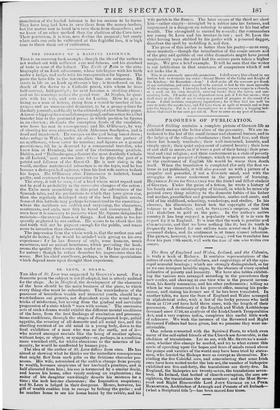ST. LEON, A DRAMA.
THE idea of St. Leon was suggested by GODWIN'S novel. For a dramatic poem the subject is not ill adapted, but is utterly unfitted for the stage. As in Manfred, the development of the character of the hero should be the main business of the piece, to which every thing else must be subordinate. The wretchedness of the possessor of boundless wealth and imtnortal youth, should be a wretchedness sui generic, not dependent upon the usual stage. tricks of misfortune, but arising from the gradual and inevitable progression of a state which " wars with nature." The successive acts of such a drama would exhibit the different mental conditions of the hero, from the first flushings of exultation and presump- tuous confidence, through the stages of disappointed hope, palled appetite, the severing of all domestic and all social ties, and the startling contrast of an old mind in a young body, down to the final exhibition of a man who was on the earth, not of it— who moved amongst mortals like the being of another sphere, without .hope, or object, or sympathy—or, perhaps, in a condition more wretched still, for whilst obnoxious to the miseries of hu- manity, he would be unaffected by human joys. The idea of the author of St. Leon differs from ours. He has aimed at showing what he thinks are the immediate consequences that might flow from such gifts as the fictitious character pos- sesses. His wife, astonished at the sudden change from poverty to wealth, becomes suspicious of her husband's practices, and is half alienated from him; his son is tormented by a similar doubt, and leaves his home, after vainly seeking an explanation; the suitor of his daughter unwillingly deserts his mistress for a time ; the mob become clamorous; the Inquisition suspicious; and St. Leon is lodged in their dungeons. Hence, however, his gift of wealth enables him to escape by bribing the gaoler ; and he reaches home to see his house burnt by the rabble, and his
wife perish in the flames. The later scenes of' the third act silo* him—rather simply—inveigled by a robber into his fortress, and imprisoned in a dungeon on refusing to minister to his lust after wealth. The stronghold is carried by assault ; the commanders are young St. Leon and his brother-in-law ; and St. Leon the elder having been stabbed by his gaoler with a poisoned dagger, dissolves the spell by unfolding it, and dies.
The prose of this author is better than his poetry—more easy, more masterly—though the introduction of the comic scenes and of the play and quibble of our elder dramatists might have jarred unpleasantly upon the mind had the serious parts taken a higher range. We give a brief example. It will be seen that the writer is not infelicitous in that smartness of comparison which if not wit looks like it.
This is an extremely agreeable promotion. I shall wear a blue riband in my button hole to designate my order—Grand Master of the Cellar and Knight of the Kitchen : Sir Bernadine—hem ! I shall make all the servants get drunk at my installation, and order myself to be carried to bed by the most agreeable of the waiting-maids. I intend to look as big among 'em as a verger in a church, or a cock on his own dunghill, crowing loader than the latter, and out- strutting both. I'll make all my dependents turn pale if I do but sneeze; they shall start at the fall of my fu,tstep as a parcel of puppies at the sound of a drum. I shall institute sumptuary regulations ; for if they feed too well 'tis sure to make the rascals lazy, and I'd have them as agile as weasels and as lean Ian) the bargain. Fat is a sad ineumbrance to a domestic ; a hugging bed- fellow that can't be too soon got rid of. Now to enter on my pust of honour.
























 Previous page
Previous page